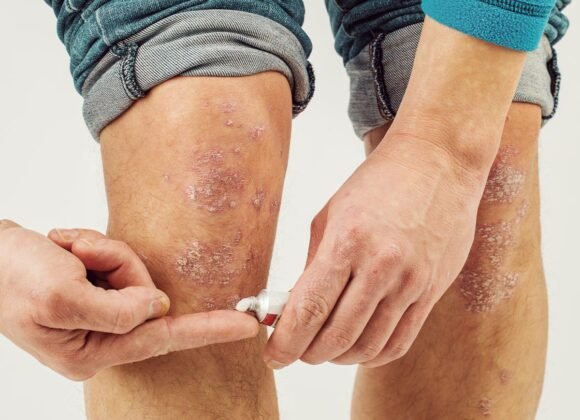Hormonal changes are a natural occurrence in both males and females throughout various life stages, including puberty, pregnancy, menstruation, and menopause. Hormones are essential for regulating numerous bodily functions, including skin health. Eczema, also referred to as atopic dermatitis, is a chronic skin condition characterized by redness, itching, and inflammation.
Scientific research has demonstrated that fluctuations in hormone levels can significantly affect eczema symptoms. Understanding this relationship is crucial for effective management of the condition. Puberty is a period of substantial hormonal changes as the body transitions from childhood to adulthood.
These hormonal shifts can potentially trigger or worsen eczema symptoms in some individuals. Women may experience hormonal fluctuations during their menstrual cycle, pregnancy, and menopause, which can lead to exacerbations of eczema symptoms, including increased itching, redness, and inflammation. It is important for those with eczema to be cognizant of these hormonal changes and their potential impact on their skin condition.
Key Takeaways
- Hormonal changes can impact eczema symptoms, as fluctuations in estrogen and progesterone levels can lead to skin irritation and flare-ups.
- Eczema triggers such as stress, sweat, and certain skincare products can exacerbate symptoms during hormonal fluctuations.
- Hormonal changes can lead to increased inflammation and decreased skin barrier function, contributing to eczema flare-ups.
- Managing eczema symptoms during hormonal shifts may involve adjusting skincare routines, using gentle products, and seeking medical advice if necessary.
- Hormonal influences on eczema severity can vary from person to person, making it important to monitor and manage symptoms accordingly.
Eczema Triggers and Hormonal Fluctuations
Hormonal Changes During Puberty
During puberty, the surge in hormone levels can lead to an increase in sebum production, which can contribute to clogged pores and acne breakouts in addition to eczema flare-ups. Hormones such as estrogen and progesterone can affect the skin’s barrier function and immune response, leading to increased sensitivity and reactivity in individuals with eczema.
Hormonal Fluctuations During Menstrual Cycle and Pregnancy
Women may experience eczema flare-ups during their menstrual cycle due to changes in hormone levels. Pregnancy is another time when hormonal fluctuations can impact eczema symptoms. Some women may experience improvement in their eczema during pregnancy, while others may notice an increase in symptoms. The changes in hormone levels during pregnancy can affect the immune system and skin barrier function, leading to changes in eczema symptoms.
Hormonal Changes During Menopause
Menopause is also a time of significant hormonal changes for women, which can impact eczema symptoms. The decrease in estrogen levels during menopause can lead to drier skin and decreased collagen production, which can exacerbate eczema symptoms. Understanding these hormonal triggers is essential for effectively managing eczema symptoms.
The Link Between Hormonal Changes and Eczema Flare-Ups
The link between hormonal changes and eczema flare-ups is complex and multifaceted. Hormones play a crucial role in regulating the skin’s barrier function, immune response, and inflammatory processes. Estrogen, progesterone, and testosterone are all involved in modulating these processes, and fluctuations in hormone levels can impact the skin’s health.
For example, estrogen has been shown to have anti-inflammatory effects on the skin, while progesterone can have pro-inflammatory effects. Changes in the balance of these hormones can lead to increased inflammation and sensitivity in individuals with eczema. In addition to their effects on the immune system and inflammation, hormones also play a role in regulating the skin’s moisture levels.
Estrogen, in particular, has been shown to increase skin hydration and promote collagen production. During times of hormonal fluctuations, such as during menstruation or menopause, the decrease in estrogen levels can lead to drier skin and decreased collagen production, which can exacerbate eczema symptoms. Understanding the link between hormonal changes and eczema flare-ups is essential for developing targeted treatment strategies for individuals with the condition.
Managing Eczema Symptoms During Hormonal Shifts
Managing eczema symptoms during hormonal shifts requires a multifaceted approach that addresses both the underlying hormonal imbalances and the skin’s specific needs. For women experiencing eczema flare-ups during their menstrual cycle, it may be helpful to track their symptoms and identify patterns related to their hormone levels. This can help them anticipate when flare-ups are likely to occur and take proactive measures to manage their symptoms.
Using gentle skincare products and moisturizers during this time can help support the skin’s barrier function and minimize irritation. During pregnancy, it is important for women with eczema to work closely with their healthcare provider to manage their symptoms safely. Some medications commonly used to treat eczema may not be safe during pregnancy, so alternative treatment options may need to be explored.
Emollient creams and ointments can help keep the skin hydrated and reduce itching during pregnancy. For women going through menopause, it is important to focus on maintaining skin hydration and supporting collagen production. Using moisturizers with ingredients like hyaluronic acid and ceramides can help replenish the skin’s moisture barrier and minimize dryness.
Hormonal Changes and Skin Irritation in Eczema Patients
Hormonal changes can lead to increased skin irritation in individuals with eczema due to their effects on the skin’s barrier function and immune response. During puberty, the surge in hormone levels can lead to increased sebum production, which can contribute to clogged pores and acne breakouts in addition to eczema flare-ups. This increase in oil production can lead to increased skin irritation and inflammation, exacerbating eczema symptoms.
Similarly, women may experience increased skin sensitivity and reactivity during their menstrual cycle due to changes in hormone levels. Pregnancy is another time when hormonal changes can impact skin irritation in individuals with eczema. The changes in hormone levels during pregnancy can affect the immune system and skin barrier function, leading to changes in eczema symptoms.
Some women may experience improvement in their eczema during pregnancy, while others may notice an increase in symptoms. Menopause is also a time of significant hormonal changes for women, which can impact skin irritation in individuals with eczema. The decrease in estrogen levels during menopause can lead to drier skin and decreased collagen production, which can exacerbate eczema symptoms.
Hormonal Influences on Eczema Severity
Hormonal Regulation of Skin Processes
These hormones regulate the skin’s barrier function, immune response, and inflammatory processes. Fluctuations in hormone levels can impact these processes, leading to changes in eczema severity.
The Impact of Hormonal Imbalance
Estrogen has anti-inflammatory effects on the skin, while progesterone can have pro-inflammatory effects. Changes in the balance of these hormones can lead to increased inflammation and sensitivity in individuals with eczema. Hormones also regulate the skin’s moisture levels, with estrogen increasing skin hydration and promoting collagen production.
Targeted Treatment Strategies
Decreases in estrogen levels during menopause can lead to drier skin and decreased collagen production, impacting the severity of eczema symptoms and leading to increased dryness and itching. Understanding these hormonal influences is essential for developing targeted treatment strategies for individuals with eczema.
Tips for Managing Eczema Symptoms During Hormonal Changes
Managing eczema symptoms during hormonal changes requires a proactive approach that addresses both the underlying hormonal imbalances and the specific needs of the skin. For women experiencing eczema flare-ups during their menstrual cycle, it may be helpful to track their symptoms and identify patterns related to their hormone levels. This can help them anticipate when flare-ups are likely to occur and take proactive measures to manage their symptoms.
Using gentle skincare products and moisturizers during this time can help support the skin’s barrier function and minimize irritation. During pregnancy, it is important for women with eczema to work closely with their healthcare provider to manage their symptoms safely. Some medications commonly used to treat eczema may not be safe during pregnancy, so alternative treatment options may need to be explored.
Emollient creams and ointments can help keep the skin hydrated and reduce itching during pregnancy. For women going through menopause, it is important to focus on maintaining skin hydration and supporting collagen production. Using moisturizers with ingredients like hyaluronic acid and ceramides can help replenish the skin’s moisture barrier and minimize dryness.
In conclusion, hormonal changes have a significant impact on eczema symptoms for many individuals with the condition. Understanding the relationship between hormonal fluctuations and eczema is essential for effectively managing the condition. By addressing both the underlying hormonal imbalances and the specific needs of the skin during these times of change, individuals with eczema can better manage their symptoms and improve their overall quality of life.
Working closely with healthcare providers to develop targeted treatment strategies is essential for effectively managing eczema symptoms during hormonal shifts.
FAQs
What are hormonal changes?
Hormonal changes refer to fluctuations in the levels of hormones in the body, which can occur during puberty, menstruation, pregnancy, and menopause.
How do hormonal changes affect eczema symptoms?
Hormonal changes can affect eczema symptoms by triggering flare-ups or worsening existing symptoms. This is due to the influence of hormones on the immune system and skin barrier function.
Which hormones are involved in worsening eczema symptoms?
Estrogen and progesterone are the primary hormones involved in worsening eczema symptoms. These hormones can impact the skin’s ability to retain moisture and regulate inflammation.
Are women more likely to experience hormonal-related eczema flare-ups?
Yes, women are more likely to experience hormonal-related eczema flare-ups due to the influence of menstrual cycles, pregnancy, and menopause on hormone levels.
Can hormonal changes be managed to improve eczema symptoms?
Yes, hormonal changes can be managed to improve eczema symptoms. This may involve working with a healthcare provider to explore hormone-regulating treatments or adjusting skincare routines during hormonal fluctuations.




